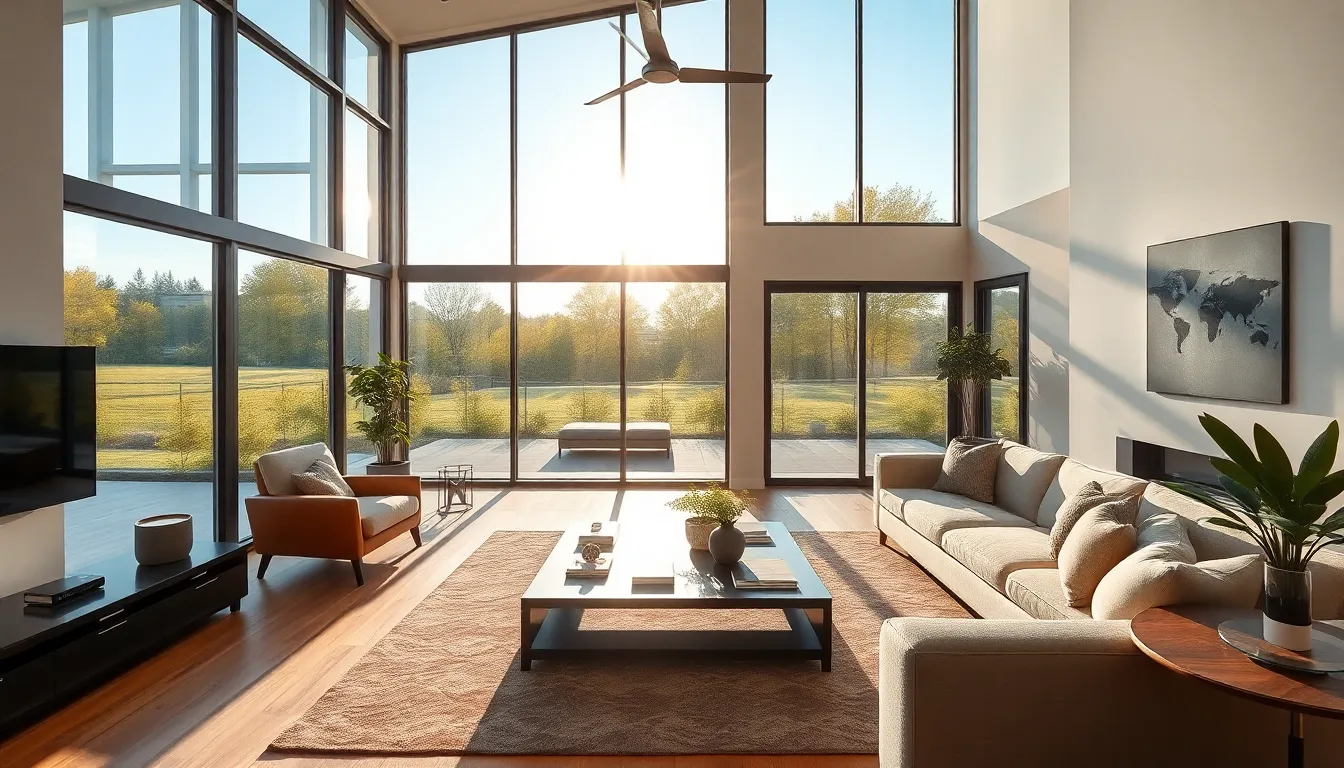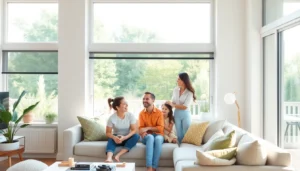Imagine a world where your windows do more than just let in light and give you a view of your neighbor’s questionable lawn ornaments. Enter smart windows—your home’s new best friend. These high-tech marvels not only adjust to the sun’s whims but also help save on energy bills. Who wouldn’t want a window that can keep their house cooler in summer and warmer in winter while giving a nod to eco-friendliness?
Table of Contents
ToggleWhat Are Smart Windows for Homes?
Smart windows represent an advanced technology designed to optimize energy efficiency and indoor comfort. These windows utilize specialized materials that react to environmental changes, particularly sunlight. Homeowners appreciate the ability of smart windows to automatically adjust tint levels, reducing glare and improving privacy without compromising natural light.
Electrochromic and photochromic technologies underpin the functionality of smart windows. Electrochromic windows change opacity by applying a small electric charge, while photochromic windows respond to sunlight exposure. Both types provide significant benefits, including reduced energy costs and enhanced comfort throughout different seasons.
Installation of smart windows often results in lower heating and cooling expenses. Research indicates that homes with smart windows can save up to 30% on energy bills compared to traditional windows. These savings stem from the windows’ ability to reflect or absorb heat, keeping indoor spaces at ideal temperatures.
Homeowners also recognize environmental advantages linked to smart windows. By conserving energy, these windows contribute to a reduction in carbon footprints. Many manufacturers produce smart window products that meet or exceed energy efficiency standards, promoting sustainability.
Smart windows come equipped with sensors and control systems, allowing integration into smart home setups. These features enable users to control window settings remotely or program automatic adjustments based on specific conditions. Home automation systems enhance the user experience, offering personalized comfort according to preferences and daily routines.
With growing interest in home technology, the market for smart windows continues to expand. Industry experts forecast significant growth in adoption rates in the coming years, driven by rising awareness of energy efficiency and climate change issues. Smart windows provide modern solutions for eco-conscious homeowners seeking comfort and innovation.
Benefits of Smart Windows for Homes

Smart windows offer a range of advantages for homeowners looking to improve their living spaces. By integrating advanced technologies, these windows enhance energy efficiency and comfort.
Energy Efficiency
Smart windows significantly improve energy efficiency for residential spaces. They can save homeowners up to 30% on energy bills compared to traditional windows. This reduction occurs because smart windows adjust tint levels, which minimizes heat gain or loss. Energy savings contribute to lower utility expenses and less environmental impact. Many manufacturers produce smart windows that meet stringent energy efficiency standards. These products help reduce carbon footprints by conserving energy. Homeowners investing in smart windows benefit from both cost savings and sustainable living practices.
Enhanced Comfort
Enhanced comfort is another key benefit of smart windows. Indoor temperatures remain consistent even during extreme weather conditions. By automatically adjusting to sunlight, these windows reduce glare and improve natural light distribution. Homeowners experience greater control over their indoor environment. Sensors and smart home integration further enhance this adaptability. Automated adjustments allow windows to optimize performance based on real-time conditions. Ultimately, smart windows create a more pleasant and comfortable living space for everyone involved.
Types of Smart Windows
Smart windows come in various types, each utilizing distinct technologies to enhance home functionality and comfort. Understanding these options helps homeowners make informed choices.
Electrochromic Windows
Electrochromic windows utilize voltage to adjust tint levels. When an electrical current passes through the window, it alters its transparency, providing added privacy and reducing glare. This technology allows homes to maintain consistent indoor temperatures by minimizing heat gain. Research indicates that electrochromic windows can cut energy bills by up to 30% compared to traditional options. Integration into smart home systems enables remote control, making them convenient for daily use. Homes equipped with these windows experience improved comfort without compromising natural light.
Thermochromic Windows
Thermochromic windows react to temperature changes, altering their tint in response to heat. Increasing temperatures cause the windows to darken, effectively blocking excessive sunlight and reducing heat buildup indoors. During cooler months, they become clearer, allowing more natural light to enter and warm up living spaces. This automatic adjustment helps maintain energy efficiency year-round, contributing to lowered heating and cooling costs. Homeowners can enjoy a comfortable environment while minimizing their reliance on artificial climate control systems. Thermochromic windows represent a smart choice for those seeking energy-efficient home solutions.
Installation Considerations
Choosing the right installation method for smart windows impacts performance and efficiency. Proper installation ensures these innovative windows function optimally and provide the desired energy savings.
Professional Installation vs. DIY
Selecting professional installation for smart windows offers several advantages. Experts bring experience and knowledge, guaranteeing precise fitting and adherence to regulations. They often understand the specific requirements of different types of smart windows, such as electrochromic and thermochromic. Conversely, opting for a DIY approach may reduce initial costs, yet leads to potential challenges, including improper sealing and alignment issues that compromise energy efficiency. Homeowners should weigh their skills and available time against the benefits of professional help.
Cost Implications
Costs related to smart window installation vary significantly based on several factors. Professional installation generally ranges from $50 to $100 per hour, adding labor expenses to materials. Selecting high-quality smart windows impacts the total investment, with prices for these products typically between $500 to $1,500 per window. Homeowners often save on energy bills over time, with reports indicating up to 30% savings. Therefore, evaluating long-term benefits alongside upfront costs leads to informed decision-making in selecting smart windows.
Future of Smart Windows for Homes
The future of smart windows shows promising advancements in technology and efficiency. Innovations in materials and design will enhance the overall user experience. Increased adoption of electrochromic and thermochromic windows is likely as homeowners prioritize energy savings and environmental impact.
Projected market growth highlights a significant rise in demand for smart windows. A recent study indicates that the smart window market could reach $8 billion by 2025. Increased awareness of energy-efficient solutions drives consumer interest and investment in these technologies.
Developments in integration with home automation systems will enhance functionality. Homeowners can expect more seamless connections between smart windows and other smart devices. This connectivity allows for automated climate control, maximizing energy efficiency throughout the home.
In addition, advancements in control systems will provide enhanced customization options. Homeowners may control tint levels either through mobile applications or voice commands. This level of control empowers users to optimize indoor environments for comfort and light preferences.
Research continues to reveal benefits beyond energy efficiency. Improved sound insulation and UV protection contribute to overall home comfort. Future iterations of smart windows aim to address aesthetic considerations, blending seamlessly with various architectural styles.
Ultimately, smart windows will become an essential part of sustainable home solutions. As technology evolves, homeowners can anticipate increased affordability and accessibility. This evolution will solidify smart windows as a viable option for those looking to enhance energy efficiency and overall comfort in their homes.
Smart windows represent a significant leap in home technology that balances comfort and sustainability. By effectively managing sunlight and temperature, they not only enhance indoor living conditions but also lead to substantial energy savings. As the market for smart windows continues to grow, homeowners can look forward to more innovative features that integrate seamlessly into their lifestyles.
Investing in smart windows is not just about immediate benefits; it’s a long-term commitment to energy efficiency and environmental responsibility. With advancements on the horizon, these windows are set to become increasingly accessible and affordable, making them a smart choice for those looking to improve their homes while reducing their carbon footprint. Embracing this technology can lead to a more comfortable and eco-conscious living space.



